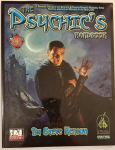General Psychic Powers/classes/ characters Thoughts.
I have elucidated most of this in the bevy of "psionics" threads over the years and those specifically related to 5e.
#1. Call them psychic powers. The bulk of the dissonance experienced by people is trying to shoehorn in a sci-fi term (psychic[powers] + bionics = psionics) into "magical" fantasy. The crystal-gazing or tarot-reading fortuneteller, the spirit-talking/channeling medium, Professor X/Jean Grey/Psylocke/White Queen/Saturn Girl/Martian Manhunter, the people with a specific suite of powers born of their own minds/mental control are all easily placed into a magical (high or low)/fantasy setting. Someone entering your mind, tricking it with illusions, speaking with/sending you "visions" (in your dreams or otherwise), or controlling you outright are longstanding fantasy tropes of all sorts: witches and wizards, genies and faeries, demons and angels. All fantasy. Not a piece of bionics/technological implants to "open/expand/warp" your brain to be seen or needed. STOP using the term "Psionics" in D&D to denote mental/psychic powers. Full stop.
#2. The character/class concepts for Psychics are broad and deep, both in terms of mythological and literary sourcing and spread of the types of abilities/array of powers that can be pursued. AS SUCH, the area of "Psychic Powers/Characters" is more than broad enough to include its own BASE class as well as multiple, individual, sub-classes of existing classes.
As "Arcane Magic/Power" [Yes, yes. I know. 5e doesn't differentiate "power/magic sources," as such. Just follow me...] has a Wizard primary/"full" caster AND an Arcane magic-using Fighter AND an Arcane magic-using Rogue AND Bard (which should/could have been the Arcane magic-using half-caster to match Paladin and Ranger) [...and Sorcerer...and Warlock...and Witch in certain systems...and and and...]
As "Divine/Clerical Power" has a Cleric primary/"full" caster AND a Divine magic-using Half-caster AND a Divine magic-using Sorcerer, "nature magics" use Druids (primary/full caster) AND Nature magic-using Half-caster AND, arguably, "nature" magic-using Barbarians...etc...
Psychic Powers[consider it "magic" if you like or not] easily avail themselves to a primary/"full caster" AND "Psychic power/magic-using" subclasses.
For starters, I would go with, Base Class: The Psychic.
Psychic base subclasses, "Disciplines": Telepath (mind stuff, communications, alterations, illusions).
Telekinetic (force stuff, easily teased out to specific elementalist type control for your Pyro-/Cryo-kineticists, etc...).
Clairvoyant (remote seeing and whatever cool tricks you can do with that)
...maybe Empath (for a psychic healer/emotion controller).
The "Half-caster" Fighter Type: Mystic [the class formerly known as the "Psychic Warrior"]: the psychic-powers/expanded mind/Jedi/Warrior "half-caster" subclass. As Paladin is a divine half-caster/fighter/"knight" cleric; Ranger is a nature half-caster/fighter/rogue druid; Mystic becomes the mental "half-caster"/fighter/monk[perhaps?] psychic.
Soulknife: the psychic Rogue or Monk [Psylocke ripoff] subclass, roughly equivalent to a "third caster" level of power to match Arcane Trickster.
Ardent: the psychic Fighter subclass [essentially a psychic Warlord-type], roughly equivalent to a third-caster level of power to match Eldritch Knight.
...maybe an Oracle: the psychic Bard or Druid [or if you want to mirror PF, Sorcerer] subclass.
...maybe a "Seeker": the psychic Ranger or Barbarian subclass...some remote seeing, some self-healing, maybe some animal control?
...if you want "psychomorphs" or "psycho-porters" [never been a fan of either as "psychic" type classes] you could get other Druid/Ranger/Barbarian/Monk subclasses.
As a subclass of Wizard...I'm just not sure how that works...flavor-wise or mechanically with the Wizard spells prepared...seems there's just too much in the base class that would need to be rewritten/reworked/reskinned (and/or ignored) to get it to fit as a wizard subclass. As a Sorcerer subclass with the casting stat reworked to Int. at 1st level and the spell point mechanic already being there...seems like a much better fit.
OH! AND a "Wild Talent" Feat for "old school" style random individual powers/randomly psychically aware/capable persons.
That should cover just about everything.



